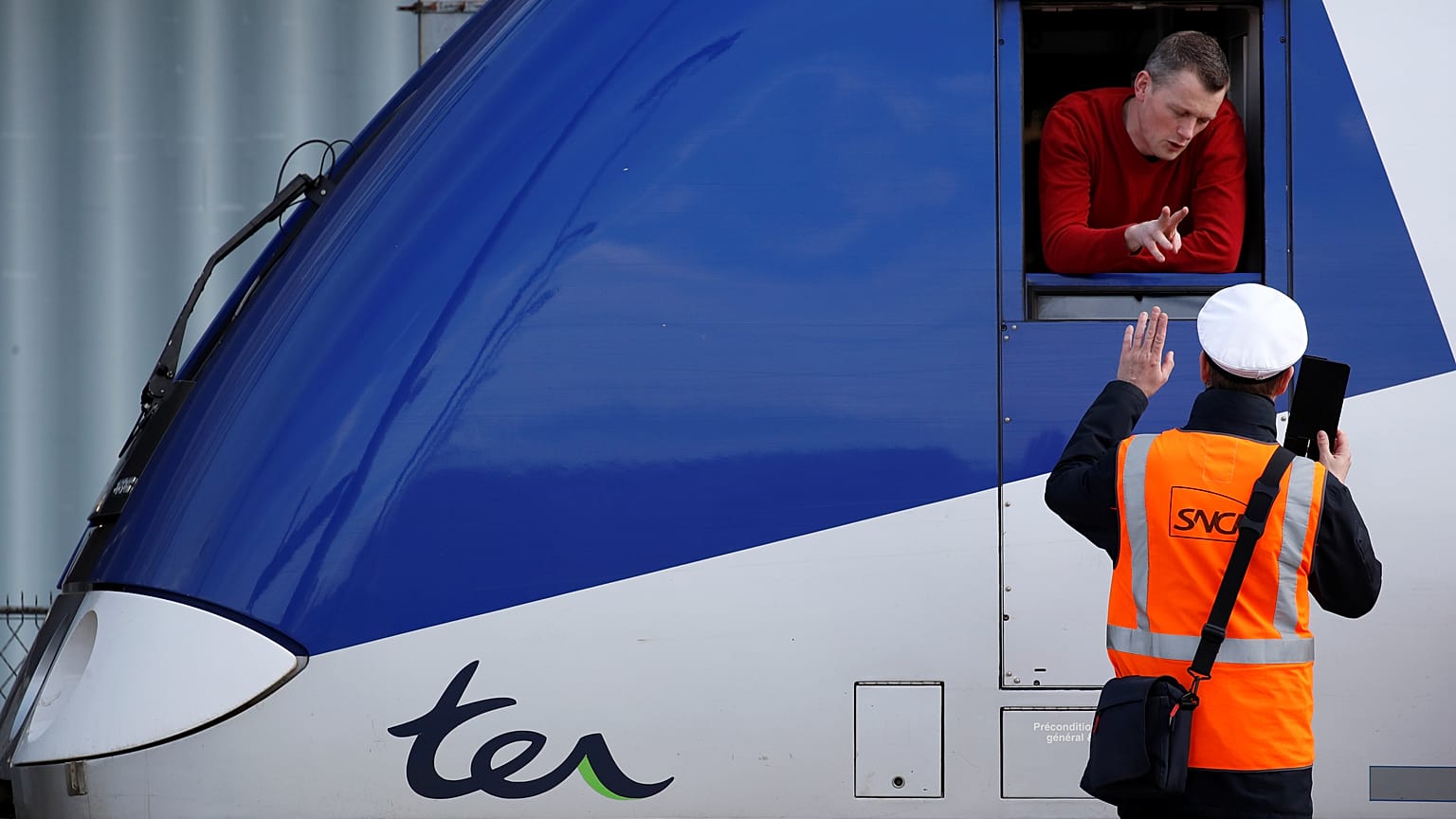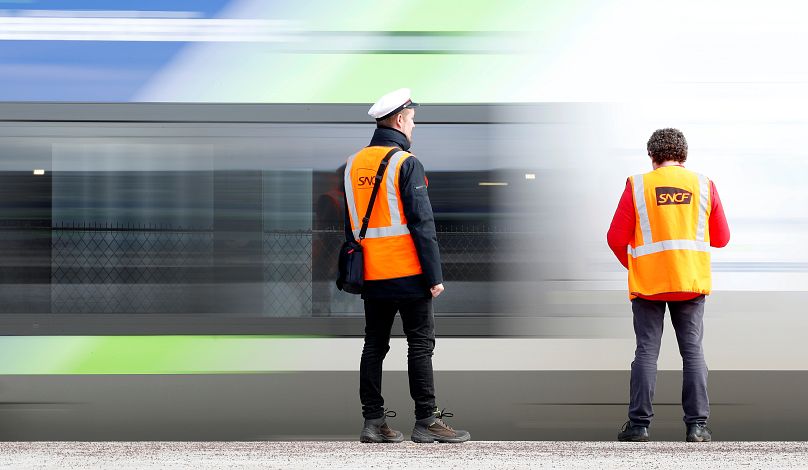37 days of rolling strikes by workers for French railway operator SNCF is set to cause much misery for passengers across the country till the end of June. But what are their demands? We explain the 'cheminot' status and why it is so important to rail workers.
A wave of rolling strikes starting this Thursday are set to severely disrupt French rail services until the end of June. Rail workers, known as ‘cheminots’, are joining forces with civil servants in a nationwide walk-out protesting against President Emmanuel Macron’s labour reforms. From April, 36 days of two-day strikes out of every five days will mean travel disruptions throughout the country.
Employees of the SNCF national rail company are protesting the government’s plans to end the benefits enjoyed by rail workers, which include early retirement, extra vacation days and free travel for family members. So far only new recruits would be affected by the changes.
What is the cheminot status?
Michel Pigenet, French history professor at Paris’ Pantheon-Sorbonne University, spoke to Euronews about the background of the special deal struck with rail workers, the so-called cheminot status.
The special status which is currently enjoyed by almost 90% of the SNCF staff was established in 1920. Before then, French railway companies — private until 1937 — were having trouble building a loyal workforce so employers hoped a “privileged” status would help retain staff.
Rail workers managed to carve out retirement and paid vacation for themselves, neither of which existed at the time, and created a social security system for themselves. “If they left the company, however, they would lose all these advantages, so that was a way of retaining their workers,” said Pigenet.
Pigenet said that at first rail unions were skeptical of the cheminot status, because they feared the advantages would commit workers to possible unfair obligations within the company.
However, France was not the only country to offer such a scheme. According to Pigenet, “Other countries also offered an advantageous status to rail workers that became a reference to other industries.”
When workers in the public sector saw the benefits cheminots had managed to secure they also began pushing for similar conditions, according Pigenet.
What are rail workers’ benefits?
Life-long contract
The status guarantees a job for life. However, the trial period is longer than usual with two and a half years for new recruits. Under the current law, a new recruit must be under 30 when hired in order to reap this benefits.
Retirement
"Retirement is very important to cheminots," said Pigenet, because "back when the status was created, it was a major thing that enticed them to stay in the companies despite the low wages.”
The government first tried to change the retirement age in August 1953 with an executive order but failed because of a long and extremely disruptive strike in the public sector.
"The strike left such a damning effect in the public’s memory that the government had to wait until 1995 to try to make changes to the cheminots retirement age; changes that would fail again" said Pigenet.
The government ultimately decided to implement changes gradually by extending the retirement age over time. Under the current system train drivers can retire as early as at 52 – a decade before the normal pension age.
Salaries
The SNCF said that the average gross salary for a cheminot was € 3,090 in 2014, which is slightly higher than the average pre-tax salary in France: € 2,912 in 2013.
However, the majority of rail workers – some 60 percent – receive less than € 3,000 per month, said the rail operator.
Free tickets
All SNCF agents enjoy a "facilites de circulation" meaning family members are able to travel for free or at a reduced price.
Vacation time
SNCF employees have 28 days of paid vacation, one more day than the average. The legal minimum is 25 days paid annual leave.
Why are they striking?
In additions to the plans to strip new recruits of the benefits enjoyed by SNCF workers, unions fear reforms might not end there but could lead to a restructuring of the rail operator and eventually lead to privatisation. Reforms also include opening passenger rail to competition by 2020.
Laurent Brun, head of the CGT Cheminots rail union, told the AFP the government “would bear responsibility for a very long and intense battle” in forcing through changes.
The government argues that the rail operator is drowning in 46.6 billion of debt and crying out for reform. The SNCF currently runs trains at a 30% higher cost than European neighbours.
Is the government right to want to make changes to this status?
“The question is whether the government reforms are part of technical changes or social changes. Is the SNCF debt determined by advantages of the cheminot contracts?” said Pigenet. He believes that the financial troubles are not directly tied to the special status. “If you compare salaries between railway workers, French cheminots earn less than other European railway workers. They have better social security but they earn less.”
Where does public opinion stand on the matter?
The public has not always been supportive of the cheminots’ strike actions, on account of the disruption they cause, says Pigenet. He believes that if the strike is only focused on maintaining their status, it will be difficult to mobilise support from the public.
"But if we look at the overall reform and we take in the debt question, then the cheminots don’t have anything to do with that. And as for the public service question, telling regions who don’t have any financial capability to manage smaller lines will probably lead to their complete shutdown. That way public opinion could be sensitized," said Pigenet.
What do cheminots think?
Emilien Cousin, 34, is a railway worker in Paris who currently enjoy the special benefits. He will be attending tomorrow’s strike.
He says that cheminots are very worried that they will lose their job security and may be fired as a result of the operator’s mammoth debt. “We’re scared that we’ll be the ones paying that debt with our jobs.”
For Cousin government plans to privatise rail operators is also a big deal: “We saw how other public companies, La Poste or France Telecoms, ended up when they were opened to private funds. The change of their status was ravaging bringing a lot of suicides, a lot of pressure. We don’t want to end up like them.”
Cousin believes that changes should be approached another way but that it shouldn’t be up to the cheminots to pay for the government’s “strategic choices” that he says led to the debt. He hopes Macron steers clear from forcing through changes by executive order. “Executive orders rile up the unions because we feel like our democratic right to debate [with the government] is taken away and that’s not good for anyone,” he said.

















